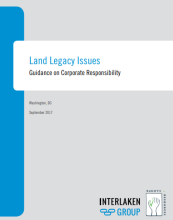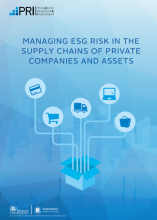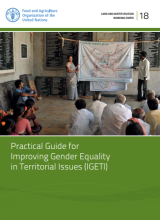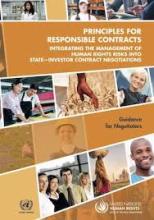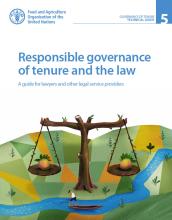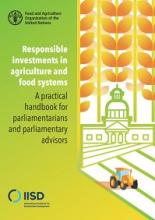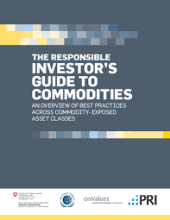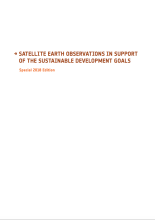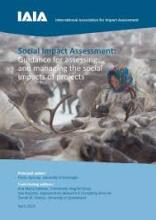Resources for Service providers
Land Legacy Issues - Guidance on Corporate Responsibility
This Guide aims to inform companies that hold land or purchase land directly from companies that hold land. It provides operational guidance for companies confronting “legacy land issues” and clarifies a company’s roles and responsibilities in dealing with legacy land issues in their existing holdings, while also providing direction on where to look for more detailed information and tools.
Managing ESG Risk In The Supply Chains Of Private Companies and Assets
This guide is primarily intended for private equity and real asset investors seeking to improve the risk profile of their portfolios and maximise their returns by investing in companies that manage their supply chains effectively. It provides information on what to look for and on how to engage with companies on E&S risks in supply chains.
Practical Guide for Improving Gender Equality in Territorial Issues (IGETI)
This guide presents a people-centred gender approach to increase and improve the provision of goods and services from agriculture, forestry and fisheries in a sustainable manner while reducing rural poverty. It first introduces the proposed approach for improving gender equality in territorial issues, with specific guidance for each phase of the gender-response planning process. Then, it presents some available participatory tools to support planning of gender-responsive territorial development. It will be relevant to a broad spectrum of actors: government officials and policy-makers, civil society groups, development practitioners and consultants.
Principles for Responsible Contracts - Integrating the Management of Human Rights Risks into State-Investor Contract Negotiations - Guidance for Negotiators
These principles provide guidance on ways to align business objectives with the safeguard of human rights. The principles aim to integrate the management of human rights risks into contract negotiations on investment projects between host State entities and foreign business investors, building on the UN’s Guiding Principles on Business and Human Rights.
Respecting the human rights of communities: a business guide for commercial wind and solar project deployment
This guide provides companies involved in wind and solar projects with information and strategies to identify, prevent, mitigate, and account for adverse human rights impacts that they cause, contribute to, or are directly linked to through their operations, products, or services, by virtue of their business relationships. It may also be useful for investors, business partners, government actors, civil society organizations, communities, and other stakeholders. It comes with a Legal Risk Primer.
Responsible governance of tenure and the law - A guide for lawyers and other legal service providers
This guide is aimed at legal professionals working with governments, civil society, the private sector or development agencies as well as law societies, notaries, judges and all those who are interested in understanding the role of law in giving effect to the provisions of the Guidelines (VGGT). The VGGT provide important elements for shaping a well-functioning legal framework to facilitate their effective implementation at the national level. The technical guide reviews the legal implications of the VGGT and provides guidance on assessing national legislation, legal reform and improved implementation as well as the settlement of disputes
Responsible investments in agriculture and food systems – A practical handbook for parliamentarians and parliamentary advisors
This Handbook provides a comprehensive and systematic overview of the role that Parliamentarians and Parliamentary Advisors can play in the creation of reliable, coherent, and transparent “enabling environments” in the range of areas related to investment in agriculture and food systems. It does so through guidance notes, examples of good practices, and very practical indications, and sets out key stages of processes and mechanisms for MPs and advisors to consider while promoting responsible investment in agriculture and food systems.
Responsible Investor’s Guide to Commodities: an Overview of Best Practices across Commodity-Exposed Asset Classes
This guide presents a range of best-practice measures for investors and their consultants aimed at managing environmental and social risks that they should carefully consider and implement across different commodity-related investments. It covers E&S risk assessments across different sectors of investments, and includes a special section on investments in agriculture and farmland.
Satellite Earth Observations in Support Of The Sustainable Development Goals
This Handbook aims to explain how satellite Earth Observation (EO) are an essential tool in the development of the information and evidence required by many of the SDG Targets and Indicators.It has been prepared for national agencies, UN bodies and other SDG stakeholders working towards a collective implementation of the 2030 Agenda and towards a cost-effective response of countries to the SDG monitoring and reporting challenges.
Social Impact Assessment: Guidance for assessing and managing the social impacts of projects
This Guidance Note provides advice about what is expected in good practice social impact assessment (SIA) and social impact management processes, especially in relation to project development. It is intended for private sector actors, government agencies, development banks and agencies, civil society organisations, and service providers. It provides guidance to help reduce companies' risk exposure and assist them in being compliant with international standards and/or good practice as they evolve over time by addressing significant human rights issues associated with a project.


